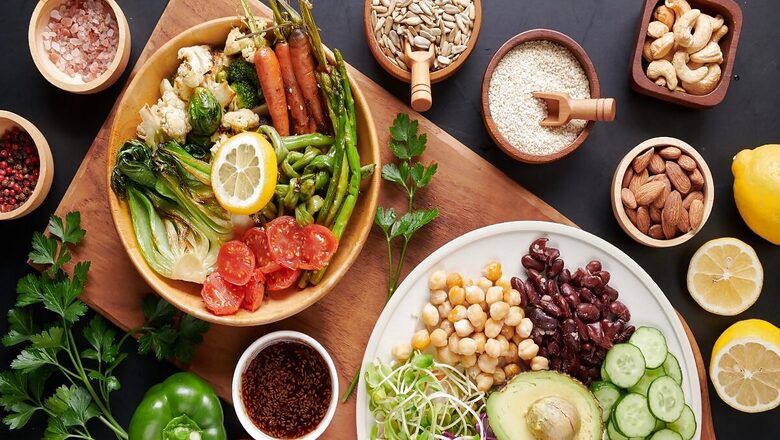
views
Women have unique nutritional needs due to various physiological changes they experience throughout their lives, from menstruation and pregnancy to menopause. To support these transitions, it is essential to focus on a well-rounded diet rich in nutrients that promote overall health. However, in many households, women’s nutritional needs are often overlooked, and food choices are made without considering their impact on well-being.
Preeti Pande, Dietitian, Apollomedics Super Speciality Hospital, Lucknow, and Dr. Rashi Chahal, Clinical Nutritionist, Fortis La Femme GK, share insights on the key nutrients women should include in their diet for optimal health.
- Protein: The Building Block of HealthProtein plays a critical role in maintaining overall health, particularly for women. Dietitian Preeti Pande notes that Indian diets are often carbohydrate-heavy, with many individuals consuming less protein than recommended. “The Recommended Dietary Allowance (RDA) suggests 0.9 grams of protein per kilogram of body weight, but most Indians consume only 0.4-0.5 kg/ideal body weight,” she explains. It is essential to focus on lean protein sources, such as dals, legumes, nuts, and dairy products, to meet daily requirements. To optimize nutrient absorption, Pande recommends opting for buttermilk, curd, or raita over milk added to tea.
- Folate and Iron: Supporting Blood HealthFolate and iron are vital for women due to menstrual blood loss and pregnancy preparation. To maintain adequate levels, Pande advises including dark leafy greens, citrus fruits, legumes, jaggery, and channa in the diet. These nutrients are essential for blood synthesis and preventing anemia, which is common among women.
- Omega-3 and Omega-6 Fatty Acids: Boosting Brain and Heart HealthOmega-3 and Omega-6 fatty acids play a crucial role in brain and heart health. A small portion of mixed nuts, including almonds, walnuts, and figs, provides a good balance of these essential fats. Pande emphasizes the importance of controlling portions, suggesting ten to twelve pieces of nuts per day to avoid excess calorie intake.Dr Rashi Chahal adds that Omega-3 fatty acids, particularly DHA and EPA, support cognitive function, reduce inflammation, and lower the risk of heart disease. “Found in fatty fish like salmon, flaxseeds, and walnuts, these fats are vital for brain health and overall well-being,” she explains.
- Healthy Fats: Choosing the Right OnesThe selection of fats is crucial for maintaining a balanced diet. Pande recommends incorporating healthy fats such as olive oil, mustard oil, ghee, and sunflower oil, each offering its own benefits when consumed in moderation.
- Calcium and Vitamin D: Managing Menstrual Cramps and MenopauseFor women experiencing menstrual cramps or navigating menopause, calcium and vitamin D are essential. These nutrients help relax muscles and manage symptoms like hot flashes. “Vitamin D, along with phytoestrogens, helps reduce the severity of menopause symptoms and supports bone health,” says Dr. Chahal. Dairy products, fortified plant-based milk, and leafy greens are excellent sources of these nutrients.
- Magnesium: Combatting Muscle FatigueMagnesium is another critical nutrient for women, especially for those dealing with post-workout cramps or fatigued muscles. “Magnesium helps regulate muscle and nerve function, preventing cramps,” shares Dr. Chahal. Foods rich in magnesium include nuts, seeds, bananas, and leafy greens.
- Vitamin A and Antioxidants: Supporting Healthy VisionWomen need to ensure their diet includes vitamin A and antioxidants like lutein and zeaxanthin for optimal eye health. “These nutrients protect against age-related vision degeneration,” says Dr Chahal. Carrots, sweet potatoes, and leafy greens are great sources to include in your diet.
- Iron, Biotin, and Zinc: Promoting Hair Growth and StrengthIron, biotin, and zinc are crucial for hair growth and preventing hair loss. “Iron helps fight anemia and supports energy levels, which is particularly important for women,” notes Dr. Chahal. Eggs, nuts, beans, and lean meats are excellent sources of these nutrients.
- Vitamin C: For Radiant SkinVitamin C plays a key role in collagen production, helping maintain skin elasticity and reduce signs of aging. “Vitamin C-rich foods like guava, berries, and bell peppers promote radiant skin and support collagen synthesis,” says Dr. Chahal.
Foods to Avoid
Pande advises avoiding processed foods and aerated drinks, which are high in unhealthy sugars and chemicals that may affect fertility. Instead, focus on fresh, nutrient-dense options.
Physical Activity and Breathing Exercises
Diet is only one part of the equation for maintaining health and well-being. Regular physical activity, combined with breathing exercises, plays a significant role in supporting overall health. Breathing exercises increase oxygen intake, rejuvenating the skin and promoting cell renewal.
By focusing on these essential nutrients and maintaining a balanced lifestyle, women can support their health and well-being through every phase of life.




















Comments
0 comment